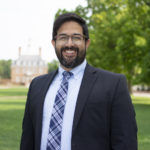 By Brent Newberry
By Brent Newberry
Growing up with privilege in America, I took religious liberty for granted. In fact, I only viewed religious liberty from the perspective of someone from above, or as someone from the inside. My time in Williamsburg further opened my eyes to the vantage points of people from the bottom, and the outside.
Baptists were those people at one time. Maybe not in the South when I was a kid, but two hundred plus years ago, they were the ones who were imprisoned; they were the ones they tried to silence. The irony is that you can’t really shut Baptists up. If there’s one thing we’re good at, it’s making a raucous. Even in prison, they found ways to preach the Good News.
Of course, even my knowledge of Baptists is skewed toward my privilege. I knew of Roger Williams, of the Massachusetts Baptists who were exiled to Rhode Island, of John Leland and the role Baptists played in the Bill of Rights. I wasn’t aware of the Black Baptists’ role in the early days of our history.
I was moved nearly to tears as we sat together and learned about the Black Baptist Meetinghouse in Williamsburg. As we read about the courage of these enslaved persons, I couldn’t help thinking how we give so much attention to the ministers—most often white—not just when they’re famous or charismatic, but even when they’re persecuted. Yet here an entire congregation was enslaved, in a lifelong prison, and we don’t celebrate them like we do the white Baptist preachers who were locked up. If the Baptist tradition was borne of dissent and courage, then black Baptists embodied it better than most.
At the First Baptist Church of Williamsburg, I was invited into the pride and celebration of this historic church. Begun in 1776, this black Baptist congregation first met in a bog or a forest, with their first black pastor, and here we were nearly 250 years later ringing a bell in a historic sanctuary that had been rung by the first black President. As a Baptist pastor, I’m a descendent of this history, whether I’d ever been taught so or not.
I’m still processing why the racial oppression of slavery weighed so heavily on my heart and mind during a seminar on religious liberty. Except I can’t escape the juxtaposition of the notion of religious liberty against the backdrop of enslaved persons’ churches. One historical marker noted that the enslaved persons turned to the Baptist and other Christian congregational traditions because “everyone was equal in the eyes of God.”
Because liberty is essential to human dignity. They’re inextricably linked. We cannot fully recognize someone’s dignity if we don’t ensure their liberty. Freedom of conscience, to worship how or who or what one chooses, is what it means to be human. If that is kept from someone, then dehumanization has already begun, and slavery, whether in makeshift cages at a border or internment camps in WWII or chains during the Civil War, is only a step or two further.
So, religious liberty is about so much more than simply allowing people to worship. It’s about their fundamental right to exist—to be human. When we begin to allow our governments to diminish or denigrate or discriminate against people because of their religion, when entire religions are misunderstood or misrepresented or mischaracterized by our governments, we aren’t protecting anyone—we’re harming everyone.
The challenge of a nation that has ensured religious liberty for two centuries is that charitably, it can create complacency for the religious majority, or more critically, it induces a kind of hypocrisy that forgets that they were once the minority, too, and inevitably will be again.
And that’s the irony of my perspective growing up. A Baptist kid with the privilege of being in the religious majority in the South, taking for granted the very liberty that made it possible.
Never again.
Brent Newberry is the Pastor at the The First Baptist Church of Worcester in Worcester, Massachusetts.




